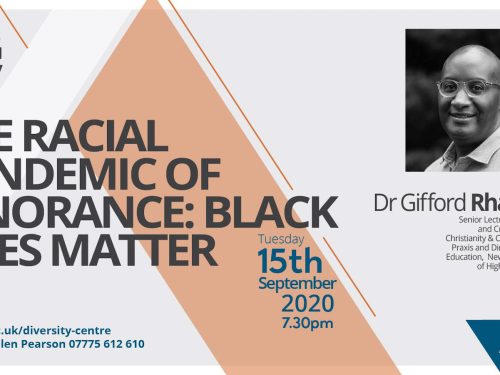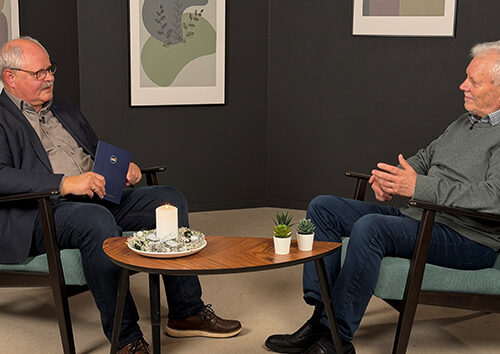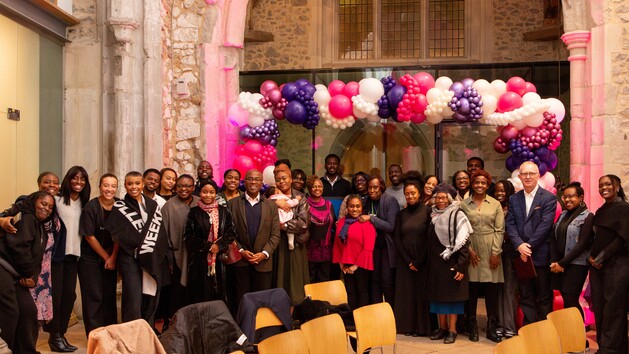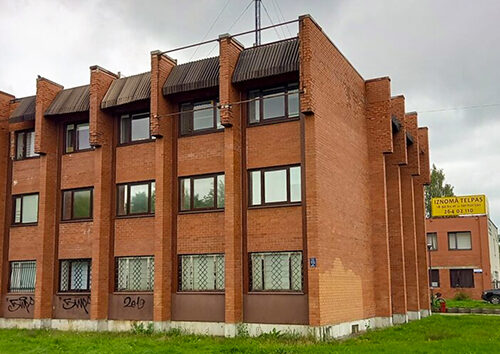30 September 2020 | Binfield, UK [Helen Pearson]
Diversity Seminars at Newbold College of Higher Education have been recorded for some years now. For a variety of reasons, the Q&A sessions, which members of the audience frequently judge as ‘the best part of the evening’, have not been recorded.
Then came the pandemic. And on Tuesday, 15 September, Newbold’s Diversity Centre ran its first-ever Diversity Lecture entirely online. The host for the evening was the Centre’s Dr Mike Pearson. The speaker was Dr Gifford Rhamie, Senior Lecturer in Pastoral and Biblical Studies and Director of Field Education at Newbold. The lecture title was: The Racial Pandemic of Ignorance: Black Lives Matter. The Diversity Centre received 230 registrations for this event. On the night itself, there were 171 unique viewers from around the world – from inside the Seventh-day Adventist community and outside it – from people in majority black churches, those in majority white churches and those in no churches at all. The lecture was livestreamed and posted on the College’s Facebook page where it was viewed 1,200 times in the first 48 hours.

 The Zoom webinar application offered the facility for comments and questions from this large group to be posted throughout the lecture. 1,600 words worth of questions came in – half a lecture in themselves! Predictably, less than a quarter of the questions could be dealt with in the time available. And yet – along with the lecture they demonstrate the variety of attitudes, the complexity of the problem of ignorance about prejudice, and the individual and structural nature of racism which Dr Rhamie outlined in his lecture.
The Zoom webinar application offered the facility for comments and questions from this large group to be posted throughout the lecture. 1,600 words worth of questions came in – half a lecture in themselves! Predictably, less than a quarter of the questions could be dealt with in the time available. And yet – along with the lecture they demonstrate the variety of attitudes, the complexity of the problem of ignorance about prejudice, and the individual and structural nature of racism which Dr Rhamie outlined in his lecture.
Dr Rhamie’s lecture can be watched online here. Sadly, the audience on the night and since are unable to see the huge variety of questions which came in. For the sake of that audience and as an incentive to others to watch the lecture, a summarised list of the questions follows. We hope that a consideration of these questions will enable all of us of all races to reflect widely on the vital questions raised by the lecture and by the Black Lives Matter movement.
1. Who decides that a white person born in Africa is not referred to as an African?
2. Is it possible to make a distinction between Black Lives Matter (BLM) – the organisation – and the sentiment of Black Lives Matter. Can Christians align with others on BLM from a biblical basis? How can we respond to the allegedly Marxist basis of BLM?
3. What do you think the church needs to do in order to eradicate racism in its structure and put Jesus first?
4. Do we think of racism in a too binary way, not recognising a spectrum between out-and-out ignorance, small and unthinking acts, and plain prejudice?
5. Do current conversations about racism primarily serve the purpose of appeasing white consciences?
6. Is there such a person as ‘a non-racist’?
7. When does instilling a sense of nationhood become racist?
8. Western Christianity and white supremacy seem to be very aligned. Is there a need now for a paradigm shift where the gospel is re-defined? In the light of this lecture, do Adventists need to rethink how we read the Bible as prophetic literature against empire?
9. How does the division of Seventh-day Adventist church conferences into separate black and white organisations in some parts of the world fit into your picture of racism among Christians?
10. In the UK we have large black and Asian Seventh-day Adventist congregations and small white ones. How should we approach education on racism there?
11. How should the church demonstrate solidarity with victims of racism beyond symbolic gestures and the ‘we are all the same under God’/‘I don’t see colour’ approach ?
12. Is today’s racism not only a matter of the colour of your skin but also a political and economic issue?
13. Does Critical Race Theory obscure the reality that racism is a function of the sinful nature?
14. Does Critical Race Theory encourage anyone who is not white to ignore any racism in their own hearts?
15. What process takes place in professing Christians’ minds theologically and psychologically that allows Biblical teachings on compassion and justice not to register with people who are defensive regarding the extent of the racism pandemic and the church’s involvement?
16. Why is it less socially acceptable to talk about racism than to talk about sexism?
17. Is it a racist assumption to suggest that white people talk in an echo chamber to other white people?
18. How do we come to terms both as black Christians and white with images of a white Jesus and the white-washing of the apostles?
19. Why do some white individuals in particular (some of whom are in the church) see any discussion, let alone action addressing racism as such a threat to them personally?
20. What practical steps can I take individually:
- to acknowledge race and challenge it inside and outside the church?
- to encourage pastors and church leaders to talk about racism and do more than make symbolic gestures saying things like ‘We are all the same under God’?
- to speak truth to power both in the church and in the secular world?
- to help members of our ethnically monochrome church to have a greater understanding of racism and the unconscious ways in which we have become complicit in it?
- to teach black history in church?
- to encourage church leaders to share power in the church?
- to tackle racism when it is directed at me personally?
tedNEWS Staff: Victor Hulbert, editor; Deana Stojković, associate editor
119 St Peter’s Street, St Albans, Herts, AL1 3EY, England
E-mail: [email protected]
Website: www.ted.adventist.org
tedNEWS is an information bulletin issued by the communication department of the Seventh-day Adventist Church in the Trans-European Division. Readers are free to republish or share this article with appropriate credit including an active hyperlink to the original article.



